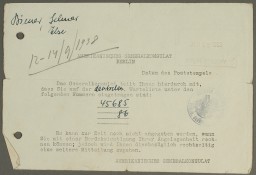<< Previous | Displaying results 1711-1720 of 6707 for "" | Next >>
-
Jazz musician Valaida Snow
FilmIn the 1930s, famous Tennessee jazz musician Valaida Snow was known as “Little Louis” because her talent with a trumpet rivaled the legendary Louis Armstrong. She performed around the world, but it was a tour of Europe that would haunt her for the rest of her life. While in German-occupied Denmark, Snow is said to have been arrested and imprisoned in Copenhagen. It is still unclear why she was arrested or what was done to her while she was held, but after her release in a May 1942 prisoner exchange,…
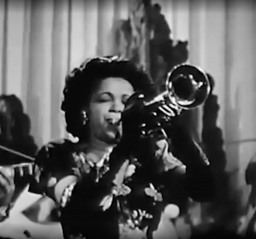
-
Some Were Neighbors
FilmHow was the Holocaust possible? The central role of Hitler and other Nazi Party leaders is indisputable. Less well understood is these perpetrators’ dependence on countless others. In countries across Europe, tens of thousands of ordinary people actively collaborated with German perpetrators of the Holocaust. Many more supported or tolerated the crimes. The special exhibition Some Were Neighbors: Collaboration & Complicity in the Holocaust was underwritten in part by grants from The David Berg…
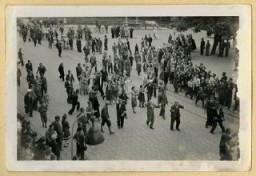
-
Ritchie Boys
Article“Ritchie Boys” is a term used for American soldiers who trained at Camp Ritchie during World War II. Several thousand were Jewish refugees from Europe. Learn more.
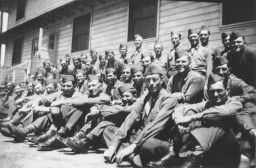
-
Axis Powers in World War II
ArticleThe three principal partners in the Axis alliance were Germany, Italy, and Japan. Learn more about the Axis powers in WW2.

-
Dismissal letter
DocumentDuring the interwar period Dr. Susanne Engelmann served as the principal of a large public high school for girls in Berlin. This letter notified her of her dismissal, as a "non-Aryan," from her teaching position. The dismissal was in compliance with the Civil Service Law of April 7, 1933. On April 7, the German government issued the Law for the Restoration of the Professional Civil Service (Gesetz zur Wiederherstellung des Berufsbeamtentums), which excluded Jews and political opponents from all civil…
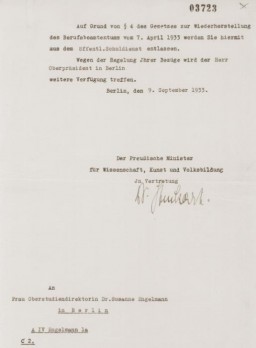
-
Safe conduct pass issued to a prisoner in Djelfa
DocumentSafe conduct pass issued to Hans Landesberg in the Djelfa internment camp, releasing him to leave for Algiers. Djelfa, Algeria, January 26, 1943. Hans was born in Vienna, Austria, and went to medical school. After graduating, he left for Paris and joined a battalion of the International Brigade to fight in the Spanish Civil War. He returned to France in February 1939, only to be interned first in Argeles and then in Gurs. Some time after the French surrender to Nazi Germany in June 1940, Hans and other…
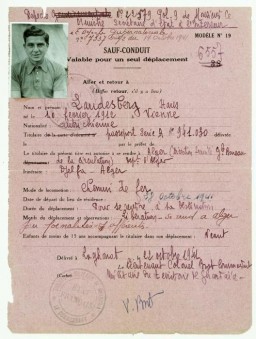
-
Dismissal letter from the Berlin transit authority
DocumentA letter written by the Berlin transit authority (Berliner Verkehrs Aktiengesellschaft) to Viktor Stern, informing him of his dismissal from his post with their agency as of September 20, 1933. This action was taken to comply with provisions of the Law for the Restoration of the Professional Civil Service. On April 7, the German government issued the Law for the Restoration of the Professional Civil Service (Gesetz zur Wiederherstellung des Berufsbeamtentums), which excluded Jews and political opponents…
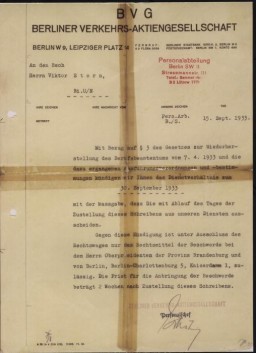
-
A notice sent by the American Consulate General in Berlin regarding immigration visas
DocumentA notice sent by the American Consulate General in Berlin to Arthur Lewy and family, instructing them to report to the consulate on July 26, 1939, with all the required documents, in order to receive their American visas. German Jews attempting to immigrate to the United States in the late 1930s faced overwhelming bureaucratic hurdles. It was difficult to get the necessary papers to leave Germany, and US immigration visas were difficult to obtain. The process could take years.
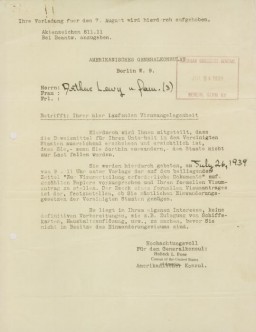
-
Seward Daily Gateway, April 14, 1933
DocumentSeward Daily Gateway (Alaska) article from April 14, 1933, titled "Great Bonfires of Forbidden Books in Germany to Blaze." This article from Berlin, written the month before the book burnings took place, reported that "Great bonfires will be burning on the campus of German universities in a few days, when the latest Nazi decree goes into effect. The Hitler regime is continuing its nationalistic crusade, has ordered that all books which deal with non-German subjects or espouse non-German causes, must be…
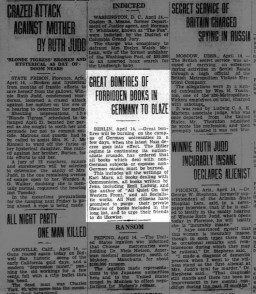
-
On the waiting list for American visas
DocumentSelmar and Elsa Biener joined the waiting list for US immigration visas in September 1938. Their waiting list numbers—45,685 and 45,686—indicate the number of people who had registered with the US consulate in Berlin. By September 1938, approximately 220,000 people throughout Germany, mostly Jews, were on the waiting list.
